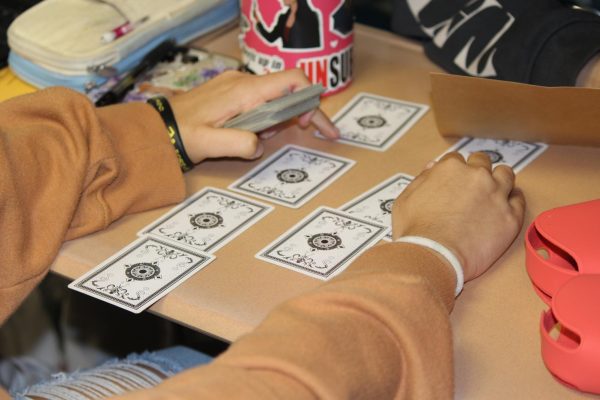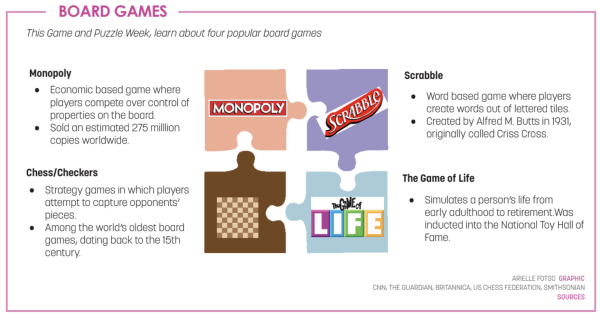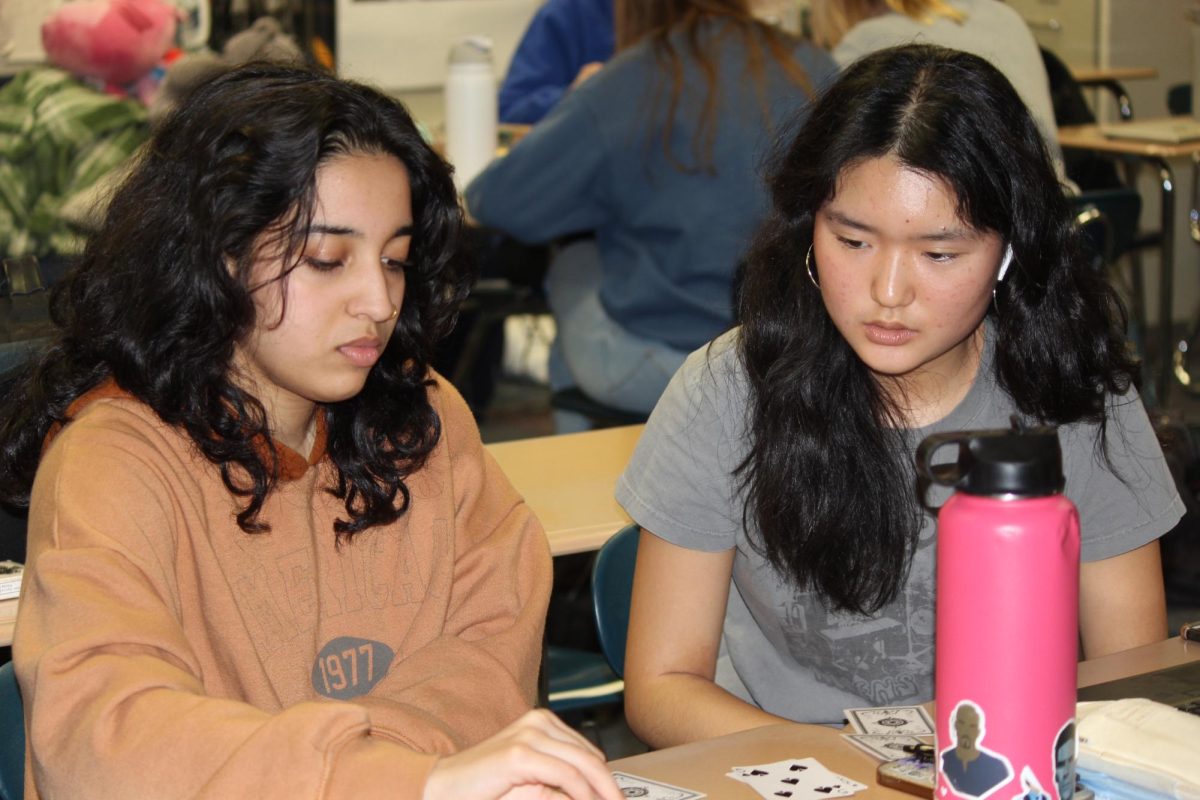Senior Mallory Gardner has been applying to college in hopes of one day becoming a fourth-grade teacher. In preparation, Gardner has been taking the course Early Childhood Education A/B, and she said she has come to understand child development. Gardner said board games and mind puzzles can play a big role in development.
“The experience of being around a table with other people (and) playing a game was something I have loved,” Gardner said.

Gardner also said board games relate to and play a crucial role in child development.
“Looking at it from the perspective of growth and development, especially for young children, it is more important for them to get hands-on experience with tangible things rather than (playing) on a tablet because of that real-world experience. Actually manipulating things is just great for development,” she said.
In light of the approaching National Librarian Day on Jan. 27, Rebecca Kunz, Youth Services Librarian at CCPL, said she agreed with Gardner’s opinion that board games helped children develop.
“For children, there are a variety of things board games do,”she said. They build literacy skills. Play is one of the tenets of early literacy. It builds social skills because you are playing with others. Depending on the game, you are learning how to count. Also, they learn language just verbally if they are early readers they can pick out words on the board. It can teach critical thinking and strategy depending on the game,” she said.
Gardner also said, while she has come to understand why board games are so beneficial for child development, she sees how board games go beyond brain development to form genuine connections.
“There’s a lot of aspects of friendly competition and also working together so getting people to collaborate especially in ways they wouldn’t usually, with people they wouldn’t usually, it’s something that unites people,” Gardner said.
For her part, Kunz said she agreed.

“For teens, (games are) a good icebreaker.” Kunz said. “(They’re) a way for them to get to know other teens. It becomes a little less awkward once you are playing a game.”
Robyn Viall, cadet teacher and senior, said they found that board games serve as an outlet to disconnect from technology, especially for teens.
“I think just not being on your phone and connecting with others (is important),” they said.
Viall also said board games and fidget toys can serve as a tool in the classroom and for neurodivergent students.
“Cadet teaching I think I’ve seen times where my students might benefit at the end of the day or after a test to cool down and socialize in that way,” Viall said. “Yes, board games and fidget toys can definitely be helpful to neurodivergent students. My sibling is on the spectrum with certain board games. It helped them think more, as a kid, and even just to fidget and do something as far as their attention.”
Gardner said, for her, board games played a big role in her life, both in and out of school.
“All of my friends and I used to play board games growing up in middle school. It was always a really big part of what we did,” Gardner said. “So playing board games for me has always kind of made those bonds and created friendships.”
















































































![Review: “The Immortal Soul Salvage Yard:” A criminally underrated poetry collection [MUSE]](https://hilite.org/wp-content/uploads/2025/03/71cju6TvqmL._AC_UF10001000_QL80_.jpg)
![Review: "Dog Man" is Unapologetically Chaotic [MUSE]](https://hilite.org/wp-content/uploads/2025/03/dogman-1200x700.jpg)
![Review: "Ne Zha 2": The WeChat family reunion I didn’t know I needed [MUSE]](https://hilite.org/wp-content/uploads/2025/03/unnamed-4.png)
![Review in Print: Maripaz Villar brings a delightfully unique style to the world of WEBTOON [MUSE]](https://hilite.org/wp-content/uploads/2023/12/maripazcover-1200x960.jpg)
![Review: “The Sword of Kaigen” is a masterpiece [MUSE]](https://hilite.org/wp-content/uploads/2023/11/Screenshot-2023-11-26-201051.png)
![Review: Gateron Oil Kings, great linear switches, okay price [MUSE]](https://hilite.org/wp-content/uploads/2023/11/Screenshot-2023-11-26-200553.png)
![Review: “A Haunting in Venice” is a significant improvement from other Agatha Christie adaptations [MUSE]](https://hilite.org/wp-content/uploads/2023/11/e7ee2938a6d422669771bce6d8088521.jpg)
![Review: A Thanksgiving story from elementary school, still just as interesting [MUSE]](https://hilite.org/wp-content/uploads/2023/11/Screenshot-2023-11-26-195514-987x1200.png)
![Review: "When I Fly Towards You", cute, uplifting youth drama [MUSE]](https://hilite.org/wp-content/uploads/2023/09/When-I-Fly-Towards-You-Chinese-drama.png)
![Postcards from Muse: Hawaii Travel Diary [MUSE]](https://hilite.org/wp-content/uploads/2023/09/My-project-1-1200x1200.jpg)
![Review: "Ladybug & Cat Noir: The Movie," departure from original show [MUSE]](https://hilite.org/wp-content/uploads/2023/09/Ladybug__Cat_Noir_-_The_Movie_poster.jpg)
![Review in Print: "Hidden Love" is the cute, uplifting drama everyone needs [MUSE]](https://hilite.org/wp-content/uploads/2023/09/hiddenlovecover-e1693597208225-1030x1200.png)
![Review in Print: "Heartstopper" is the heartwarming queer romance we all need [MUSE]](https://hilite.org/wp-content/uploads/2023/08/museheartstoppercover-1200x654.png)




